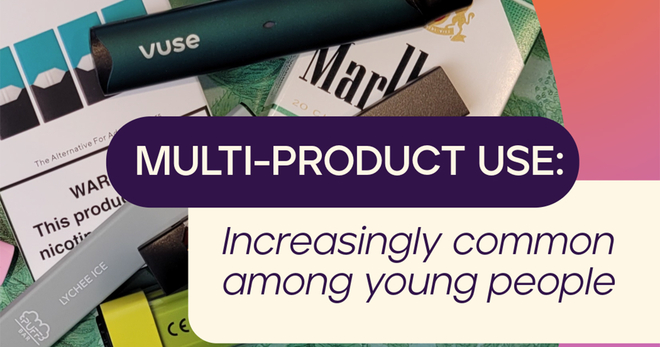Outbreak of vaping-related lung injuries linked with lower intentions to use e-cigarettes among young people
News of the nationwide outbreak of e-cigarette/vaping associated lung injury (EVALI) was associated with views about the risks of e-cigarettes among young users and non users, according to new Truth Initiative research. These findings suggest that encouraging awareness of the health risks of vaping can support efforts to prevent e-cigarette use and encourage quitting.
Young e-cigarette users aged 15-24 who perceived risk of lung injury from using e-cigarettes during the nationwide outbreak of e-cigarette/vaping associated lung injury (EVALI) in 2019 had twice the odds of intending to quit vaping compared to those with lower risk perceptions, according to the research published in Tobacco Control. Young people who didn’t use e-cigarettes who perceived risk of lung injury during the outbreak had lower intentions to own e-cigarettes.
The U.S. faced a nationwide outbreak of lung injuries associated with vaping, resulting in 2,807 hospitalized EVALI cases or deaths reported to CDC from all U.S. states, two territories and D.C. as of February 18, 2020. Understanding how young people responded to the EVALI outbreak can inform the development of effective risk communication strategies concerning new and emerging vaping-related conditions.
Greater intentions to quit vaping associated with higher risk perceptions of vaping
The new study used rapid weekly tracking data to measure young people’s awareness of the EVALI outbreak in real time. Among current e-cigarette users, those who perceived risk of lung injury had twice the odds of intending to quit vaping compared to those with lower risk perceptions.
Non-users who perceived risk of lung injury from e-cigarettes expressed lower intentions to own e-cigarettes compared to those who had lower risk perceptions. Ever e-cigarette users had 75% decreased odds of intending to own an e-cigarette, and those who had never used e-cigarettes had 39% decreased odds.
Awareness of EVALI tied to higher perceptions of the risks of vaping
Participants were asked to indicate their agreement about their risk of lung injury following vaping: “If I were to vape/use e-cigarettes now, the following could happen to me within the next year: [My lungs could be seriously injured].” Youth and young adults who were aware of the EVALI outbreak had higher risk perceptions of e-cigarette use. Current e-cigarette users had 1.6x higher odds and non-users had more than twice the odds of perceiving risk of lung injury compared to those who weren’t aware of EVALI.
Those who were aware of EVALI news had higher odds of believing that e-cigarettes contain dangerous chemicals among both current users (1.5x higher odds) and non-users (1.9x higher odds). Current users and non-users also had higher odds of belief that e-cigarettes are harmful - 1.66x and 1.67x higher odds, respectively.
Perceptions of harm, quitting intentions vary by race
Black non-Hispanic current users had more than twice the odds of intending to quit and significantly higher odds of perceiving lung injury risk and harmfulness of e-cigarette products compared to white non-Hispanic current users. For decades, the tobacco industry has targeted African Americans and strategically marketed its products to appeal to the community, including placing more advertising in predominantly black neighborhoods and in publications popular with black audiences.
Researchers surveyed 222 participants a week for a total sample of 3,536 respondents from September 2019 through January 2020. Researchers asked participants if they had seen certain EVALI news items in the media and about perceived lung injury risk/product harm and their intentions to quit vaping or purchase vaping products. Read the full research article.
Resources for learning about the health risks of vaping and quitting
Vaping: Know the truth, a national youth vaping prevention curriculum developed as part of Truth Initiative’s nationally recognized youth anti-vaping truth® campaign, gives young people the facts about e-cigarette use and provides resources to quit with This is Quitting, a first-of-its-kind quit vaping program for teens and young adults. The curriculum offers a modern approach to guide teachers and educate America’s youth about the dangers associated with e-cigarette use and vaping.
This is Quitting is a free and anonymous text message program is tailored by age group to give teens and young adults appropriate recommendations about quitting, and features tips and encouragement from other young people who have used the program. Preliminary data published in Nicotine & Tobacco Research showed after just two weeks of using This is Quitting, more than half of participants — 60.8% — reported that they had reduced or stopped using e-cigarettes. Teens and young adults can text “DITCHVAPE” to 88709 and get immediate help. Parents of young people who vape can get support at BecomeAnEX.org.
More in emerging tobacco products
Want support quitting? Join EX Program
By clicking JOIN, you agree to the Terms, Text Message Terms and Privacy Policy.
Msg&Data rates may apply; msgs are automated.


